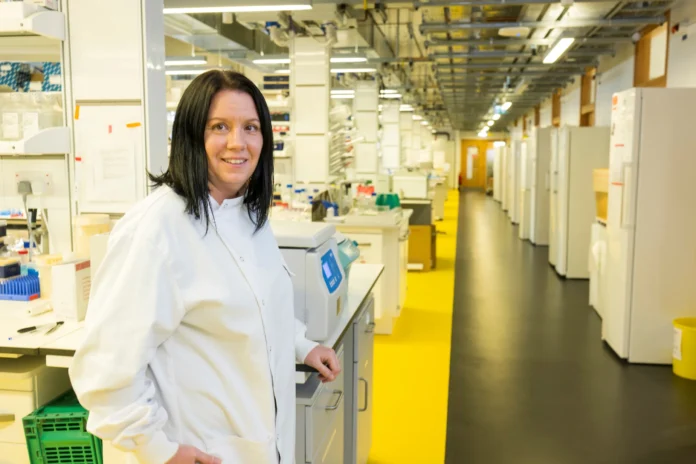Science
Groundbreaking Study Reveals Immune System Insights for Bowel Cancer

Researchers at the University of Galway have achieved a significant breakthrough in understanding how bowel cancer can suppress the immune system. Their study offers new insights into reversing this process, which could enhance treatment options for patients. The findings were published in the Journal for ImmunoTherapy of Cancer (JITC), marking a pivotal moment in cancer research.
The team discovered that structural stromal cells within tumors actively inhibit the immune response. This research opens the door to innovative approaches to immunotherapy, particularly for colorectal cancer, a disease that affects over 2,500 people annually in Ireland alone and is the second leading cause of cancer-related deaths worldwide.
Colorectal cancer diagnoses among individuals under 50 have escalated dramatically, nearly doubling since 1990. According to Professor Aideen Ryan, a leading figure in tumor immunology at the University of Galway, traditional immunotherapy has had limited efficacy for bowel cancer, leaving patients with advanced disease facing dire treatment options and poor survival rates.
The study is the first to illustrate how tumor stromal cells, which provide structural support for cancer growth, can directly reprogram the immune system. These stromal cells produce sugars known as sialoglycans that interact with immune receptors called Siglecs, effectively “turning off” critical immune cells, including natural killers (NK) and macrophages. This interaction hampers the body’s ability to combat cancer effectively.
Professor Ryan explained, “The cancer is essentially creating an immune brake—it blocks the body’s natural response and fight mechanism.” This discovery highlights the complexity of interactions between cancer cells, healthy cells, and the immune system.
Through their research, the team identified a specific enzyme responsible for this immune suppression. By using sialidases—drugs designed to inhibit this enzyme—they demonstrated that NK cells and macrophages could be reactivated, leading to tumor reduction and prevention of cancer spread, known as metastasis.
The multidisciplinary study involved collaboration with colorectal surgeons and pathologists from Galway University Hospital, including Professors Aisling Hogan and Sean Hynes. It also included contributions from Dr. Philip Dunne of Queen’s University Belfast and scientists from Palleon Pharmaceuticals in the United States, who have developed targeted therapies to disrupt the sialoglycan-Siglec interaction.
Professor Ryan remarked, “We have uncovered an entirely new checkpoint, and by focusing on it, we can reactivate the immune system and improve our body’s innate ability to fight the disease, even targeting metastasis.”
The significance of this research was echoed by Michael O’Dwyer, Professor of Medicine and Scientific Director of the University of Galway Cancer Centre. He noted the important interplay between cells within tumors that facilitates disease progression and metastasis, showcasing the innovative research being conducted at the center.
In an additional comment, Jim Broderick, Chief Executive Officer of Palleon Pharmaceuticals, emphasized the underappreciated role of the sialoglycan-Siglec axis in immunosuppression. “Targeting sialoglycan biology offers great potential for developing new therapies for diseases characterized by immune dysfunction, including cancer,” he stated.
Professor Ryan’s research is currently featured in the Breakthrough Cancer Research exhibition, “Cancer Revolution: Science, Innovation and Hope,” at Stephen’s Green Shopping Centre, which runs until October 31, 2023. The exhibition includes striking microscopy images of stromal cells and a 3D tumor model, providing a visual representation of how these cells inhibit the immune response in bowel cancer.
This groundbreaking study not only enhances our understanding of bowel cancer but also paves the way for potential advancements in immunotherapy, offering renewed hope for patients fighting this challenging disease.
-

 Top Stories1 month ago
Top Stories1 month agoTributes Surge for 9-Year-Old Leon Briody After Cancer Battle
-

 Entertainment3 months ago
Entertainment3 months agoAimee Osbourne Joins Family for Emotional Tribute to Ozzy
-

 Politics3 months ago
Politics3 months agoDanny Healy-Rae Considers Complaint After Altercation with Garda
-

 Top Stories2 months ago
Top Stories2 months agoIreland Enjoys Summer Heat as Hurricane Erin Approaches Atlantic
-

 World3 months ago
World3 months agoHawaii Commemorates 80 Years Since Hiroshima Bombing with Ceremony
-

 Top Stories3 months ago
Top Stories3 months agoFianna Fáil TDs Urgently Consider Maire Geoghegan-Quinn for Presidency
-

 Top Stories1 month ago
Top Stories1 month agoNewcastle West Woman Patricia Foley Found Safe After Urgent Search
-

 World3 months ago
World3 months agoGaza Aid Distribution Tragedy: 20 Killed Amid Ongoing Violence
-

 World3 months ago
World3 months agoCouple Convicted of Murdering Two-Year-Old Grandson in Wales
-

 Top Stories3 months ago
Top Stories3 months agoClimbing Errigal: A Must-Do Summer Adventure in Donegal
-

 Top Stories3 months ago
Top Stories3 months agoHike Donegal’s Errigal Mountain NOW for Unforgettable Summer Views
-

 World3 months ago
World3 months agoAristocrat Constance Marten and Partner Convicted of Infant Murder









